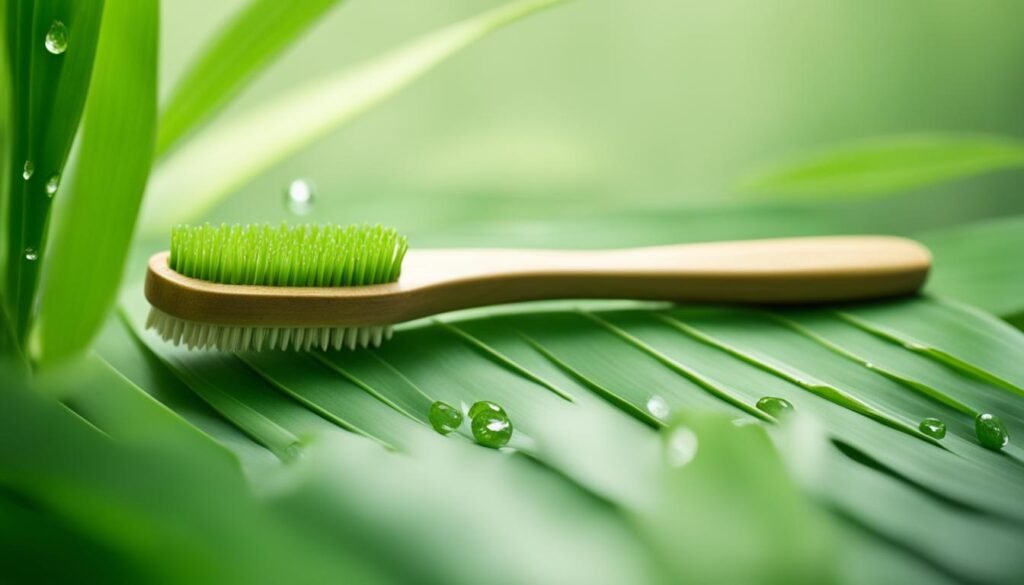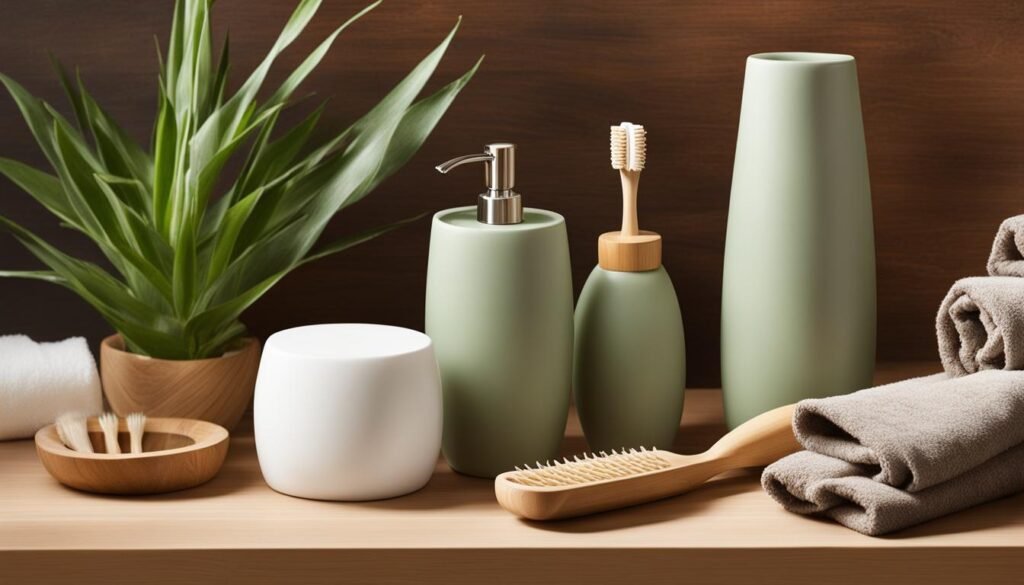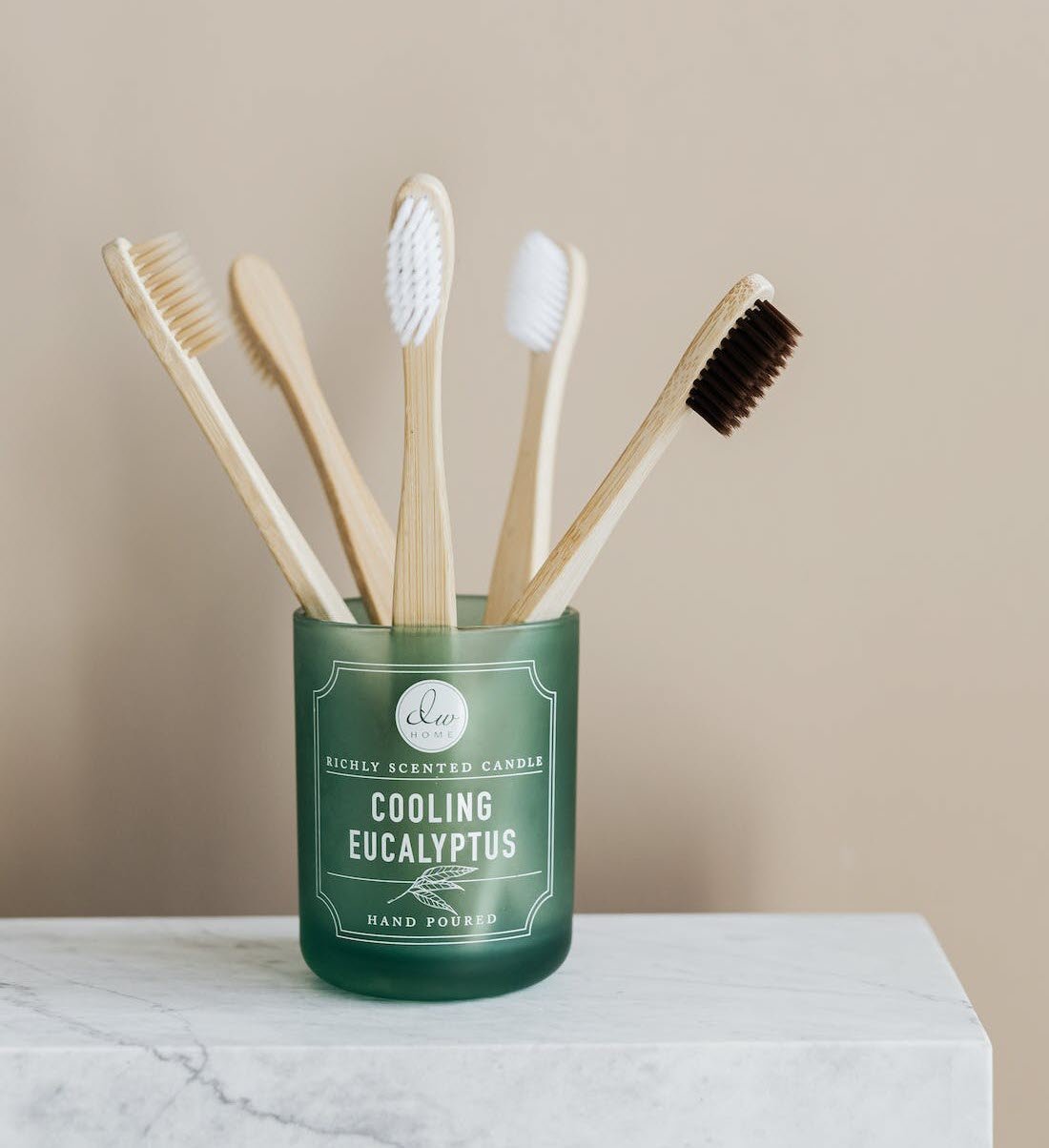Welcome to the era of sustainable oral care! As eco-conscious individuals, it’s essential for us to make environmentally friendly choices in our daily lives and reduce our carbon footprint. One simple yet impactful way to do that is by switching to bamboo toothbrushes.
Bamboo toothbrushes are the eco-friendly alternative to traditional plastic toothbrushes. They are made from sustainably sourced bamboo, a fast-growing and renewable material that reduces the need for harmful plastics. By choosing bamboo toothbrushes, we can play our part in protecting our planet and promoting a greener future.
The benefits of bamboo toothbrushes go beyond their positive impact on the environment. They are biodegradable, meaning they naturally decompose and do not contribute to the growing plastic waste problem.
With their natural bristles and organic composition, bamboo toothbrushes also provide a healthier and more sustainable option for dental hygiene.
Join the movement of eco-conscious dental care and embrace the power of bamboo toothbrushes. Let’s make a difference one toothbrush at a time and preserve the planet for future generations.
Key Takeaways:
- Bamboo toothbrushes are an eco-friendly alternative to plastic toothbrushes.
- They are made from sustainable and renewable bamboo.
- Bamboo toothbrushes are biodegradable, reducing plastic waste in our environment.
- They offer natural bristles and organic composition for a healthier dental care option.
- By using bamboo toothbrushes, we can contribute to a greener future and protect the planet.
The Plight of Plastic in Our Ecosystem
Plastic waste has become a global crisis, with severe environmental consequences. Its impact on our ecosystem is far-reaching and alarming, posing a significant threat to wildlife and human health.
Understanding the environmental consequences of plastic waste is crucial in addressing this pressing issue and finding sustainable solutions.
Understanding the Environmental Impact of Plastic Waste
Plastic pollution has become pervasive, infiltrating every corner of our planet. From the deepest seas to the highest mountains, plastic waste can be found, detrimental to both marine and terrestrial ecosystems.
The durability of plastic, combined with its improper disposal and limited recycling efforts, has led to an exponential accumulation of plastic waste in our environment.
Plastics in Every Corner: From the Deepest Seas to the Highest Mountains
The effects of plastic waste can be seen in our oceans, where marine life suffers from entanglement and ingestion of plastic debris. The Great Pacific Garbage Patch, a mass of floating plastic waste in the Pacific Ocean, highlights the scale of the problem.
Plastic pollution does not stop at the water’s edge—it also pervades our land, with microplastics contaminating soil and threatening terrestrial organisms.
BPA and Its Harmful Effects on Health and Nature
Bisphenol A (BPA), a chemical widely used in plastic production, has been linked to detrimental effects on human health. BPA can leach into food and beverages, potentially disrupting hormonal balance and contributing to various health issues.
Furthermore, BPA can find its way into the environment, affecting wildlife and ecosystems with its toxic properties.
It is vital that we address the harmful effects of plastic waste and BPA to safeguard our ecosystem and future generations. By understanding the environmental impact of plastic pollution and the risks associated with harmful chemicals, we can take necessary actions to mitigate these threats and transition towards a more sustainable and plastic-free future.
Introducing Bamboo Toothbrushes: A Sustainable Solution
Bamboo toothbrushes have gained popularity in recent years as a sustainable alternative to plastic toothbrushes. Made from eco-friendly material, these toothbrushes contribute towards sustainable oral care while reducing plastic waste.
What Makes Bamboo an Eco-Friendly Material?
Bamboo is a highly sustainable material due to its rapid growth and minimal need for resources. It is a renewable resource that can be harvested without causing deforestation.
Bamboo grows quickly, often reaching maturity within three to five years, making it an ideal choice for eco-conscious consumers. Additionally, bamboo forests play a crucial role in carbon absorption, further benefiting the environment.
The Biodegradable Advantage of Bamboo Toothbrushes
Unlike plastic toothbrushes that take hundreds of years to decompose, bamboo toothbrushes are biodegradable. They break down naturally over time, minimizing their environmental impact.
The biodegradable advantage of bamboo toothbrushes ensures a more sustainable dental hygiene routine that aligns with eco-friendly practices.
How Bamboo Toothbrushes Contribute to Sustainable Oral Care
Switching to bamboo toothbrushes is a simple yet impactful way to practice sustainable oral care. These toothbrushes not only reduce plastic waste but also offer the same level of functionality and effectiveness as traditional toothbrushes.
By choosing bamboo toothbrushes, individuals can actively participate in reducing their environmental footprint and promoting a greener future.

Behind the Scenes: The Crafting of a Bamboo Toothbrush
Have you ever wondered how a bamboo toothbrush is made? The manufacturing process behind these eco-friendly oral care products is fascinating and highlights the commitment to sustainable production.
Let’s take a closer look at the crafting of a bamboo toothbrush and the efforts taken to ensure environmentally friendly manufacturing.
At the heart of bamboo toothbrush crafting is the careful selection of high-quality bamboo. Bamboo is a fast-growing and renewable resource, making it an excellent choice for sustainable toothbrush production.
Once the bamboo is harvested, it undergoes a process of cleaning and treatment to ensure its suitability for toothbrush manufacturing.
Next, the bamboo is cut into the desired toothbrush handle shape. Craftsmen and women use their expertise to shape the bamboo handles, creating a smooth and comfortable grip for users.
This manual process adds a personal touch to each toothbrush, showcasing the dedication to precision and craftsmanship.
After shaping, the bamboo handles are sanded and polished to create a sleek and durable finish. This step not only enhances the overall aesthetic appeal of the toothbrush but also ensures a smooth surface for comfortable brushing.
Once the handles are complete, natural bristles are added. The bristles are typically made from either boar hair or plant-based materials, further aligning with the eco-friendly ethos of bamboo toothbrushes.
The bristles are carefully selected for their quality and effectiveness in providing a thorough cleaning experience.
Finally, the finished bamboo toothbrushes undergo a rigorous inspection process to ensure they meet the highest standards. This includes checking for any defects, verifying the bristle quality, and ensuring the overall integrity of the toothbrush.
The crafting and manufacturing process of bamboo toothbrushes prioritize sustainable production methods. From sourcing renewable bamboo to utilizing natural bristles, every effort is made to minimize environmental impact. This commitment to sustainable practices resonates with eco-conscious consumers who seek environmentally friendly oral care options.
By providing transparency in the production process, bamboo toothbrush manufacturers empower consumers to make informed choices. Knowing that their toothbrushes are crafted using sustainable materials and processes allows individuals to contribute to a greener future with their everyday dental hygiene routine.
So, the next time you pick up your bamboo toothbrush, remember the craftsmanship and sustainable production behind it. Choosing a bamboo toothbrush is not just about oral health; it’s an opportunity to make a positive impact on the environment.
Zero-Waste Lifestyle: From Kitchen to Bathroom Essentials
In our quest to embrace a zero-waste lifestyle, it’s essential to extend our eco-friendly choices beyond the kitchen. By making conscious decisions about the products we use in our bathrooms and kitchens, we can significantly reduce our environmental footprint and contribute to a greener planet.
Let’s explore some eco-friendly alternatives and learn how to transform our everyday essentials into sustainable choices.
Eco-Friendly Alternatives to Everyday Items
One of the first steps towards a zero-waste lifestyle is to identify and replace everyday items with more sustainable alternatives. By swapping single-use products with reusable ones, we can minimize waste and contribute to a healthier planet.
Here are some eco-friendly alternatives to consider:
- Reusable shopping bags: Say goodbye to plastic bags and opt for reusable shopping bags made from natural materials like cotton or jute.
- Silicone food storage pouches: Ditch disposable plastic bags and choose silicone food storage pouches for keeping your leftovers fresh and reducing plastic waste.
- Bamboo utensils: Replace plastic cutlery with bamboo utensils, which are biodegradable and sustainable.
Transforming the Bathroom into an Eco-Conscious Space
The bathroom is often overlooked when it comes to eco-conscious choices, but it’s a space where we can make a significant impact on waste reduction and sustainability. By incorporating eco-friendly alternatives and practices, we can turn our bathrooms into environmentally friendly spaces.
Here are some tips for creating an eco-conscious bathroom:
- Switch to bamboo toothbrushes: Replace plastic toothbrushes with biodegradable bamboo toothbrushes, like the one pictured below,

- Use refillable soap dispensers: Opt for refillable soap dispensers rather than single-use plastic soap bottles.
- Choose natural and organic toiletries: Look for natural and organic options when selecting items like shampoo, conditioner, and body wash.
Connecting Eco-Friendly Kitchen Choices with Personal Care
The kitchen and the bathroom share similarities when it comes to sustainability. By connecting eco-friendly choices in the kitchen with personal care, we can establish a holistic approach to a zero-waste lifestyle.
For example, using reusable silicone food storage pouches in the kitchen can also serve as an eco-friendly solution for storing personal care products like cotton pads or makeup wipes. Additionally, choosing organic and sustainable ingredients in your cooking can translate into a conscious selection of natural and organic toiletries.
The key is to recognize the interconnectedness of our choices and make conscious decisions that align with a sustainable lifestyle.
By adopting eco-friendly alternatives and transforming our kitchens and bathrooms into eco-conscious spaces, we can take significant steps towards reducing waste and promoting sustainability. Embracing a zero-waste lifestyle is a continuous journey, and every small change we make contributes to a greener future for ourselves and the planet.
The Lifecycle of a Bamboo Toothbrush: From Cradle to Grave
Understanding the lifecycle of a product is crucial when making eco-conscious choices. In the case of bamboo toothbrushes, their journey begins from sustainable production methods to their eventual biodegradation.
Sustainable production plays a significant role in the lifecycle of bamboo toothbrushes. The bamboo used in their production is a fast-growing, renewable resource that requires minimal water and no pesticides. By opting for bamboo toothbrushes, consumers contribute to reducing their environmental footprint.
After an eco-friendly manufacturing process, bamboo toothbrushes find their way into homes, where they perform the same function as traditional toothbrushes. However, when bamboo toothbrushes reach the end of their lifespan, they continue to contribute to sustainability.
The biodegradability of bamboo toothbrushes is a crucial aspect of their lifecycle. Unlike plastic toothbrushes that can take hundreds of years to decompose, bamboo toothbrushes biodegrade naturally, returning to the earth and leaving no lasting impact on the environment.
By considering the entire lifecycle of a product, from its production to its disposal, consumers can make informed choices that align with their commitment to sustainability. Bamboo toothbrushes offer a practical and eco-friendly alternative to traditional plastic toothbrushes, helping to reduce plastic waste and protect our planet.
Bamboo Toothbrushes and Oral Health: Dentists’ Perspectives
When it comes to maintaining good oral health, the perspective of dental professionals is invaluable. Dental professionals play a crucial role in advising patients on the best practices and products for achieving optimal dental hygiene. In recent years, there has been a growing interest in eco-friendly alternatives, such as bamboo toothbrushes, among dental professionals and their patients.
Comparing the Effectiveness of Bamboo vs. Plastic Toothbrushes
Bamboo toothbrushes have gained popularity as a sustainable alternative to traditional plastic toothbrushes. But how do they compare in terms of effectiveness? Dental professionals have conducted studies and found that bamboo toothbrushes can be just as effective as plastic toothbrushes in removing plaque and maintaining oral hygiene. The bristles of bamboo toothbrushes are made from soft, natural fibers that are gentle on the gums and teeth, making them suitable for daily use.
Natural Bristles and Your Dental Health
The use of natural bristles in bamboo toothbrushes is another factor that dental professionals consider when recommending oral care products. Natural bristles, typically made from animal hair or plant fibers, offer several benefits for dental health. These bristles have excellent cleaning properties, effectively removing plaque and debris from teeth and gums. Additionally, natural bristles are less likely to cause irritation or damage to the gums, ensuring a comfortable brushing experience for patients.
To further enhance oral health, dental professionals may recommend using toothpaste and other organic dental products in conjunction with bamboo toothbrushes. Organic dental products are free from harmful chemicals and synthetic ingredients, promoting overall oral health and reducing the risk of allergic reactions or sensitivities.
Recommendations from Dental Professionals on Organic Dental Products
Dental professionals believe that incorporating organic dental products into daily oral care routines can contribute to long-term oral health. These products are formulated with natural ingredients, such as plant extracts and essential oils, that provide antibacterial and anti-inflammatory benefits. Dental professionals often suggest organic toothpaste, mouthwash, and floss enriched with these natural ingredients to improve oral hygiene and maintain a healthy smile.
It is important to note that, while bamboo toothbrushes and organic dental products can be beneficial for oral health, regular dental check-ups and professional cleanings are essential for maintaining optimal oral hygiene. Dentists and dental hygienists play a vital role in providing personalized advice and treatments based on individual needs and oral health conditions.
| Bamboo Toothbrushes | Plastic Toothbrushes | |
|---|---|---|
| Effectiveness | Comparable to plastic toothbrushes | Effective in removing plaque |
| Bristles | Natural fibers, gentle on gums | Synthetic bristles, potential for gum irritation |
| Recommendations | Recommended by dental professionals | Commonly used but less eco-friendly |
Community and Culture: The Growing Popularity of Eco-Conscious Dental Care
As the world becomes more environmentally conscious, eco-friendly practices are gaining popularity in various aspects of our lives, including dental care. The rise of sustainable lifestyle choices has led to a cultural shift towards eco-conscious dental care within communities.
Eco-conscious dental care refers to adopting sustainable practices and using products that have a minimal impact on the environment. From bamboo toothbrushes to natural toothpaste, these eco-friendly alternatives are becoming increasingly popular among individuals who prioritize both their oral health and the health of the planet.
One of the reasons for the growing popularity of eco-conscious dental care is its positive community impact. By choosing sustainable dental products, individuals contribute to reducing plastic waste and promoting a cleaner environment. This collective effort can lead to greater awareness and inspire others to make similar eco-friendly choices.
The cultural shift towards eco-conscious dental care signifies a significant change in consumer behavior and mindset. It reflects a broader movement towards a sustainable lifestyle, where individuals recognize the importance of adopting practices that benefit not only themselves but also the planet.
Community support plays a crucial role in embracing these changes. From grassroots initiatives to organized community events, the collaborative efforts of individuals and local organizations create a sense of unity and purpose in promoting eco-conscious dental care.
By choosing eco-friendly dental products and adopting sustainable oral hygiene practices, individuals actively contribute to a sustainable future. These small but impactful changes can collectively make a difference in reducing the environmental footprint of dental care.
“The popularity of eco-conscious dental care is a testament to the growing awareness of the impact our choices have on the planet. By making sustainable choices, we not only prioritize our oral health but also contribute to the well-being of our environment.” – Dr. Jane Parker, Environmental Dentist
The growing popularity of eco-conscious dental care represents a cultural shift towards adopting a sustainable lifestyle. It highlights the power of individual choices and the positive impact they can have on the environment and the community. By embracing eco-conscious dental care, individuals become agents of change, inspiring others to follow suit and drive the evolution of a more sustainable future.
Conclusion
Embracing Change: The Shift to Eco-Conscious Choices
The environmental impact of plastic waste has brought about a significant shift in consumer behavior, driving the adoption of eco-conscious choices. The introduction of bamboo toothbrushes has emerged as a sustainable solution to combat the detrimental effects of plastic on our planet. By choosing eco-friendly oral care products, individuals can actively contribute to a greener future and make a positive impact on the environment.
Inspiring Others: The Role of Eco-Warriors in Society
Eco-warriors, individuals who champion sustainable practices, play a vital role in inspiring others to make eco-conscious choices. By sharing their knowledge, experiences, and commitment to the planet, eco-warriors motivate and empower individuals to make responsible decisions in their daily lives. Their actions not only create a ripple effect within their communities but also contribute to a collective movement towards sustainable living.
Future Outlook: The Evolution of Sustainable Products
The future of sustainable products looks promising as more and more eco-friendly alternatives continue to emerge. As technology advances and consumer demand for sustainable options increases, the evolution of eco-conscious dental and personal care products is inevitable.
Companies are investing in research and development to create innovative solutions that prioritize both the well-being of individuals and the preservation of our planet. With this momentum, we can look forward to an even greater range of sustainable choices in the coming years.
FAQ
Are bamboo toothbrushes more environmentally friendly than plastic toothbrushes?
Yes, bamboo toothbrushes are more environmentally friendly than plastic toothbrushes. Plastic toothbrushes contribute to plastic waste and pollution, while bamboo toothbrushes are made from a sustainable material and are biodegradable.
Can bamboo toothbrushes be recycled?
While bamboo toothbrushes are biodegradable, they cannot be recycled due to the combination of bamboo and bristles. It is recommended to remove the bristles before composting the bamboo handle.
Are natural bristles better for dental health?
Yes, natural bristles, such as those made from bamboo, are gentle on the gums and offer effective cleaning. They are also a healthier option compared to plastic bristles, which can harbor bacteria.
Do dentists recommend using bamboo toothbrushes?
Many dentists recommend bamboo toothbrushes due to their eco-friendly properties and effectiveness in oral care. They emphasize the importance of using natural bristles and making sustainable choices in dental hygiene.
Are there any alternatives to plastic toothbrushes for kids?
Yes, there are bamboo toothbrushes specifically designed for kids. These toothbrushes have smaller heads and softer bristles, making them suitable for children of all ages.
How long do bamboo toothbrushes last?
Bamboo toothbrushes can last as long as traditional plastic toothbrushes, which is approximately 3 months. It is recommended to replace the toothbrush once the bristles show signs of wear and tear.
Where can I buy bamboo toothbrushes?
Bamboo toothbrushes can be purchased at most health food stores, online retailers, and eco-conscious shops. They are increasingly popular, so you should have no trouble finding them.
Can I travel with a bamboo toothbrush?
Absolutely! Bamboo toothbrushes are lightweight and travel-friendly. It’s a great way to maintain your eco-conscious dental care routine even when you’re on the go.
Are there any dental products other than toothbrushes that are eco-friendly?
Yes, there are many eco-friendly dental products available on the market. These include biodegradable dental floss, natural toothpaste, and compostable toothbrushes, among others.
How can I dispose of a bamboo toothbrush?
Bamboo toothbrushes can be disposed of by removing the bristles and composting the bamboo handle. The bristles can be recycled separately if they are made of recyclable materials.




